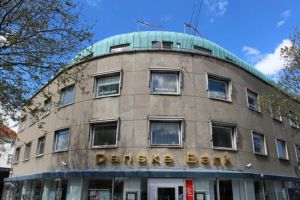News
International News in Brief: Danish authorities to investigate Danske Bank’s Estonian activities
This article is more than 7 years old.
In other news, the media are questioning why Danish companies like Ørsted are purchasing so much Russian gas and why BA refused to accept a Danish-language document as evidence in an insurance case

How much did they know? And when? (photo: Finn Årup Nielsen)
The public prosecutor for serious economic and international crime, SØIK, has launched a criminal investigation into Danske Bank over the allegations that its Estonian branch has been involved in money laundering – claims that first surfaced in September 2017.
It is believed the branch made a gross profit of 1.5 billion kroner from its non-resident portfolio between 2007 and 2015, but Danske Bank has said it will forgo all the earnings.
Last week the Estonian authorities confirmed that they also intended to investigate, and the results of Danske Bank’s own inquiry are expected in September.
READ MORE: Fines for banks over violations
Ørsted blamed for massive increase in Russian gas purchases
Danish energy companies such as Ørsted are increasingly buying their gas from Russia, according to figures released by Gazprom, the Russian state-controlled energy company, which were obtained by Danish media. Since 2013, Gazprom’s sales to Danish companies have increased six-fold, and overall Russian gas purchases have doubled. Ørsted has been blamed for the majority of the purchases, with many questioning why Denmark is opposed to Russian military activities in the Baltic countries and the Crimea, but yet boosting the country’s gas exports.
Danish police overwhelmed by US tip-offs on child pornography usage
The Danish police received 3,437 tip-offs in 2017 from their US counterparts that Danish computers were being used to spread child pornography on the internet, reports Politiken. The 20-strong team investigating cyber-related sexual offences are grateful for the help, but concerned their resources are being stretched, leading to much longer processing times. The US first started providing tip-offs in 2012, and the number has steadily increased ever since, from one in 2013 and 1,392 in 2016. Some 6,000 are expected this year.
Boris Johnson unimpressed by ‘Burqa Ban’
Boris Johnson, the former UK foreign secretary, has criticised Denmark’s decision to introduce a burqa ban, which came into force on August 1 and has rarely been out of the headlines since – both in Denmark and overseas. “I am against a total ban because it is inevitably construed – rightly or wrongly – as being intended to make some point about Islam,” wrote Johnson in his column in The Daily Telegraph. “If you go for a total ban, you play into the hands of those who want to politicise and dramatise the so-called clash of civilisations; and you fan the flames of grievance. You risk turning people into martyrs.”
Russian ambassador responds to fears over election tampering
Mikhail Vanin, the Russian ambassador to Denmark, has rubbished claims in the Danish media that Russia might use cyber warfare to try to interfere in the Danish elections, which are scheduled to take place no later than June 2019. He stated it was “extremely dangerous that the topic of so-called Russia’s interference in the Danish elections is actively promoted in Danish media”, adding that “maybe it is just the heatwave and the hot heads will cool off”.
READ MORE: Danish warships could become legitimate nuclear targets, warns Russian ambassador
BA finally compensates Dane after farcical translation issue
British Airways finally agreed to compensate a Danish woman initially refused a refund on fully-insured tickets she was unable to use due to the death of her father – because the death certificate she provided was inadmissible due to it being in Danish. Signe Spang Colding, an opera singer from Copenhagen, got busy sharing her story via social media and the media. Her father’s funeral took place on June 4 – the day she was due to fly to New York City.
Cocaine found on Maersk ship in Colombian waters
Some 1,144 kilos of cocaine with a street value of 425 million kroner has been found on a Maersk ship in Colombian waters. Already 15 people have been arrested and the drugs have been confiscated. However, no information has been released regarding their identity. The ship was due to sail to Antwerp in Belgium.










































